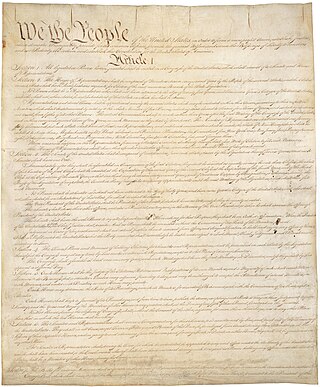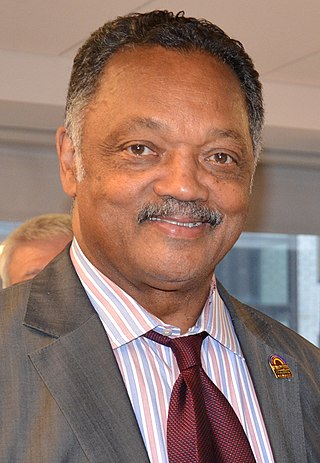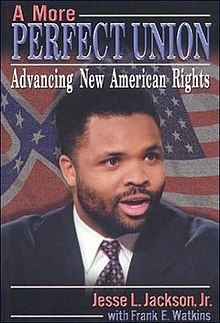
The Constitution of the United States is the supreme law of the United States of America. It superseded the Articles of Confederation, the nation's first constitution, in 1789. Originally comprising seven articles, it delineates the national frame and constraints of government. The Constitution's first three articles embody the doctrine of the separation of powers, whereby the federal government is divided into three branches: the legislative, consisting of the bicameral Congress ; the executive, consisting of the president and subordinate officers ; and the judicial, consisting of the Supreme Court and other federal courts. Article IV, Article V, and Article VI embody concepts of federalism, describing the rights and responsibilities of state governments, the states in relationship to the federal government, and the shared process of constitutional amendment. Article VII establishes the procedure subsequently used by the 13 states to ratify it. The Constitution of the United States is the oldest and longest-standing written and codified national constitution in force in the world today.

Hugo Lafayette Black was an American lawyer, politician, and jurist who served as a U.S. Senator from Alabama from 1927 to 1937 and as an associate justice of the U.S. Supreme Court from 1937 to 1971. A member of the Democratic Party and a devoted New Dealer, Black endorsed Franklin D. Roosevelt in both the 1932 and 1936 presidential elections. Before he became a Senator, Black espoused anti-Catholic views and was a member of the Ku Klux Klan in Alabama, from which he resigned in 1925. In 1937, upon being appointed to the Supreme Court, Black said: "Before becoming a Senator I dropped the Klan. I have had nothing to do with it since that time. I abandoned it. I completely discontinued any association with the organization." Black served as the Secretary of the Senate Democratic Conference and the Chair of the Senate Education Committee during his decade in the Senate. Having gained a reputation in the Senate as a reformer, Black was nominated to the Supreme Court by President Roosevelt and confirmed by the Senate by a vote of 63 to 16. He was the first of nine Roosevelt appointees to the court, and he outlasted all except for William O. Douglas.
Freedom of association encompasses both an individual's right to join or leave groups voluntarily, the right of the group to take collective action to pursue the interests of its members, and the right of an association to accept or decline membership based on certain criteria. It can be described as the right of a person coming together with other individuals to collectively express, promote, pursue and/or defend common interests. Freedom of association is both an individual right and a collective right, guaranteed by all modern and democratic legal systems, including the United States Bill of Rights, article 11 of the European Convention on Human Rights, section 2 of the Canadian Charter of Rights and Freedoms, and international law, including articles 20 and 23 of the Universal Declaration of Human Rights and article 22 of International Covenant on Civil and Political Rights. The Declaration on Fundamental Principles and Rights at Work by the International Labour Organization also ensures these rights.
Civil liberties in the United States are certain unalienable rights retained by citizens of the United States under the Constitution of the United States, as interpreted and clarified by the Supreme Court of the United States and lower federal courts. Civil liberties are simply defined as individual legal and constitutional protections from entities more powerful than an individual, for example, parts of the government, other individuals, or corporations. The explicitly defined liberties make up the Bill of Rights, including freedom of speech, the right to bear arms, and the right to privacy. There are also many liberties of people not defined in the Constitution, as stated in the Ninth Amendment: The enumeration in the Constitution, of certain rights, shall not be construed to deny or disparage others retained by the people.

Frances Ellen Watkins Harper was an American abolitionist, suffragist, poet, temperance activist, teacher, public speaker, and writer. Beginning in 1845, she was one of the first African-American women to be published in the United States.

From the first United States Congress in 1789 through the 116th Congress in 2020, 162 African Americans served in Congress. Meanwhile, the total number of all individuals who have served in Congress over that period is 12,348. Between 1789 and 2020, 152 have served in the House of Representatives, 9 have served in the Senate, and 1 has served in both chambers. Voting members have totaled 156, with 6 serving as delegates. Party membership has been, 131 Democrats, and 31 Republicans. While 13 members founded the Congressional Black Caucus in 1971 during the 92nd Congress, in the 116th Congress (2019-2020), 56 served, with 54 Democrats and 2 Republicans.
In American political discourse, states' rights are political powers held for the state governments rather than the federal government according to the United States Constitution, reflecting especially the enumerated powers of Congress and the Tenth Amendment. The enumerated powers that are listed in the Constitution include exclusive federal powers, as well as concurrent powers that are shared with the states, and all of those powers are contrasted with the reserved powers—also called states' rights—that only the states possess.

Jesse Louis Jackson Jr. is an American politician. He served as the U.S. representative from Illinois's 2nd congressional district from 1995 until his resignation in 2012. A member of the Democratic Party, he is the son of activist and former presidential candidate Jesse Jackson and, prior to his career in elected office, worked for his father in both the elder Jackson's 1984 presidential campaign and his social justice, civil rights and political activism organization, Operation PUSH. Jackson's wife, Sandi Jackson, served on the Chicago City Council. He served as a national co-chairman of the 2008 Barack Obama presidential campaign. Jackson established a consistent liberal record on both social and fiscal issues, and he has co-authored books on civil rights and personal finance.

The Civil Rights Act of 1866 was the first United States federal law to define citizenship and affirm that all citizens are equally protected by the law. It was mainly intended, in the wake of the American Civil War, to protect the civil rights of persons of African descent born in or brought to the United States.
In United States constitutional theory, compact theory is an interpretation of the Constitution which holds that the United States was formed through a compact agreed upon by all the states, and that the federal government is thus a creation of the states. Consequently, under the theory states are the final arbiters over whether the federal government has overstepped the limits of its authority as set forth in the compact. Compact theory contrasts with contract theory, which holds that the United States was formed with the consent of the people—rather than the consent of the states—and thus the federal government has supreme jurisdiction over the states.
Fundamental rights are a group of rights that have been recognized by a high degree of protection from encroachment. These rights are specifically identified in a constitution, or have been found under due process of law. The United Nations' Sustainable Development Goal 16, established in 2015, underscores the link between promoting human rights and sustaining peace.

Sandra Lee Jackson is an American politician. She was elected to the Chicago City Council as an alderman of the 7th ward of the City of Chicago in the 2007 municipal elections held on February 27, 2007. She succeeded Darcel A. Beavers who had been appointed by Chicago Mayor Richard M. Daley after the 2006 November elections to succeed her father William Beavers, Jackson's rival, as alderman of the 7th Ward. Jackson resigned from Chicago City Council, effective January 15, 2013. On February 20, 2013, Jackson pleaded guilty to one count of filing false tax returns, and on August 14, 2013 was sentenced to one year in prison.

The 1988 Jesse Jackson presidential campaign was Jesse Jackson's second campaign for President of the United States. This time, his successes in the past made him a more credible candidate and he was both better financed and better organized. Although most people did not seem to believe he had a serious chance at winning, Jackson once again exceeded expectations as he more than doubled his previous results, prompting R. W. Apple, Jr. of The New York Times to call 1988 "the Year of Jackson".
"A more perfect Union" refers to a phrase in the preamble to the United States Constitution that begins with "to form".

In the context of the United States, secession primarily refers to the voluntary withdrawal of one or more states from the Union that constitutes the United States; but may loosely refer to leaving a state or territory to form a separate territory or new state, or to the severing of an area from a city or county within a state. Advocates for secession are called disunionists by their contemporaries in various historical documents.

Jesse Louis Jackson is an American political activist, Baptist minister, and politician. He was a candidate for the Democratic presidential nomination in 1984 and 1988 and served as a shadow U.S. senator for the District of Columbia from 1991 to 1997.

The Speech: Race and Barack Obama's "A More Perfect Union" is a 2009 non-fiction book edited by T. Denean Sharpley-Whiting, author of several books on race and director of Vanderbilt University's African American and Diaspora Studies, concerning the "A More Perfect Union" speech of then-Senator Barack Obama.

Pappas v. Giuliani, 290 F.3d 143 (2002), was a case in which the United States Court of Appeals for the Second Circuit held that the First Amendment to the United States Constitution was not violated where a police officer was fired for mailing out racially offensive political materials from his home.
The right to keep and bear arms in the United States is a fundamental right protected by the Second Amendment to the United States Constitution, part of the Bill of Rights, and by the constitutions of most U.S. states. The Second Amendment declares:
A well regulated Militia, being necessary to the security of a free State, the right of the people to keep and bear Arms, shall not be infringed.
Lucius Jefferson Barker was an American political scientist. He was the Edna Fischel Gellhorn Professor and chair of the political science department at Washington University in St. Louis, and then the William Bennett Munro Professor of Political Science at Stanford University. He was an influential scholar of constitutional law and civil liberties, as well as race and ethnic politics in the United States. He published works on civil liberties in the United States and systemic racism. He was also involved with several presidential campaigns, and he wrote books about the Jesse Jackson 1984 presidential campaign, for which he was a convention delegate.












